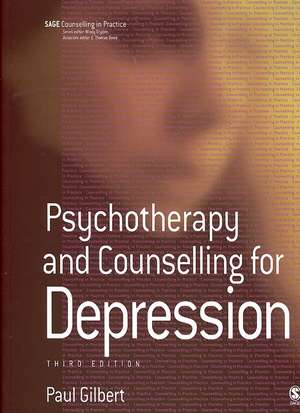Psychotherapy and Counselling for Depression: Therapy in Practice
Autor Paul Gilberten Limba Engleză Paperback – 15 mai 2007
'This book takes the reader gently but thoroughly through the biopsychosocial processes that underpin depression. Excellent worksheets and information sheets are provided as appendices. [It] is a valuable resource for those who already work with depression and essential reading for those considering working in this field' - Therapy Today
`Paul Gilbert provides the reader with a refreshingly wide-ranging, integrative and up-to-date understanding of the nature, assessment and treatment of depression. All psychological therapists will benefit from reading his important book' - Healthcare Counselling and Psychotherapy Journal
`Paul Gilbert writes in a scholarly, yet accessible, style on the bio-psychosocial perspectives of depression. I agree with him that knowledge of such areas is crucial to being able to work effectively with people experiencing depression' - Nursing Standard, 5 star review
`Psychotherapy and Counselling for Depression, Third Edition by the distinguished psychologist, Paul Gilbert, is an outstanding contribution to the field. I read this book with great enthusiasm and interest - and, I must acknowledge - admiration. All clinicians will benefit from reading this valuable book' - Robert L. Leahy, President, International Association for Cognitive Psychotherapy
Paul Gilbert's Psychotherapy and Counselling for Depression, Third Edition is a popular and practical guide to working with people suffering from depression. The book is based on a wealth of research into evolutionary, cognitive, behavioural and emotion-focused approaches to depression. It outlines how to work with general negativity, sense of failure and abandonment, and feelings of powerlessness, anger, shame and guilt
The book examines the essential stages of the therapeutic process from conceptualization and formulation through to a wide variety of interventions for different types of difficulty. It has been greatly revised, expanded and updated for the Third Edition and:
oexplores in depth the biopsychosocial processes underpinning depression
oshows how a compassionate mind approach can be incorporated into different types of therapy
oincludes a new chapter focusing on the role of the therapeutic relationship, including therapeutic dialogues
ofeatures detailed guidance with case examples on how to work with a wide variety of depressions.
Psychotherapy and Counselling for Depression, Third Edition is an essential resource and comprehensive guide for practitioners and anyone involved with treating depression.
Paul Gilbert is Professor of Psychology in the Mental Health Research Unit at Kingsway Hospital, Derby.
| Toate formatele și edițiile | Preț | Express |
|---|---|---|
| Paperback (1) | 476.41 lei 6-8 săpt. | |
| SAGE Publications – 15 mai 2007 | 476.41 lei 6-8 săpt. | |
| Hardback (1) | 1182.83 lei 6-8 săpt. | |
| SAGE Publications – 20 mai 2007 | 1182.83 lei 6-8 săpt. |
Din seria Therapy in Practice
- 22%
 Preț: 358.83 lei
Preț: 358.83 lei -
 Preț: 392.09 lei
Preț: 392.09 lei -
 Preț: 375.29 lei
Preț: 375.29 lei -
 Preț: 306.47 lei
Preț: 306.47 lei -
 Preț: 309.75 lei
Preț: 309.75 lei - 5%
 Preț: 333.15 lei
Preț: 333.15 lei -
 Preț: 477.89 lei
Preț: 477.89 lei -
 Preț: 447.09 lei
Preț: 447.09 lei -
 Preț: 431.72 lei
Preț: 431.72 lei -
 Preț: 432.48 lei
Preț: 432.48 lei - 15%
 Preț: 424.06 lei
Preț: 424.06 lei -
 Preț: 471.47 lei
Preț: 471.47 lei - 15%
 Preț: 642.74 lei
Preț: 642.74 lei - 15%
 Preț: 476.32 lei
Preț: 476.32 lei - 18%
 Preț: 416.39 lei
Preț: 416.39 lei -
 Preț: 432.18 lei
Preț: 432.18 lei -
 Preț: 211.52 lei
Preț: 211.52 lei
Preț: 476.41 lei
Preț vechi: 560.48 lei
-15% Nou
Puncte Express: 715
Preț estimativ în valută:
91.19€ • 99.09$ • 76.65£
91.19€ • 99.09$ • 76.65£
Carte tipărită la comandă
Livrare economică 22 aprilie-06 mai
Preluare comenzi: 021 569.72.76
Specificații
ISBN-13: 9781412902779
ISBN-10: 1412902770
Pagini: 424
Ilustrații: illustrations
Dimensiuni: 170 x 242 x 22 mm
Greutate: 0.72 kg
Ediția:Third Edition
Editura: SAGE Publications
Colecția Sage Publications Ltd
Seria Therapy in Practice
Locul publicării:London, United Kingdom
ISBN-10: 1412902770
Pagini: 424
Ilustrații: illustrations
Dimensiuni: 170 x 242 x 22 mm
Greutate: 0.72 kg
Ediția:Third Edition
Editura: SAGE Publications
Colecția Sage Publications Ltd
Seria Therapy in Practice
Locul publicării:London, United Kingdom
Recenzii
Excellent! Excellent! Excellent! I would thoroughly recommend this book to any other counsellor or psychotherapist. It is described on the back cover as 'outstanding', 'valuable' and an 'essential resource' and I would fully endorse all of these descriptions. I have been qualified for 10 years and have had extensive client experience, but feel I have gained so much from Gilbert's wisdom on this topic. It is excellent value for money and again I would recommend it to any practitioner.
This book takes the reader gently but thoroughly through the biopsychosocial processes that underpin depression. Excellent worksheets and information sheets are provided as appendices. [It] is a valuable resource for those who already work with depression and essential reading for those considering working in this field.
Paul Gilbert provides the reader with a refreshingly wide-ranging, integrative and up-to-date understanding of the nature, assessment and treatment of depression. All psychological therapists will benefit from reading his important book.
Paul Gilbert writes in a scholarly, yet accessible, style on the bio-psychosocial perspectives of depression. I agree with him that knowledge of such areas is crucial to being able to work effectively with people experiencing depression.
Psychotherapy and Counselling for Depression, Third Edition by the distinguished psychologist, Paul Gilbert, is an outstanding contribution to the field. I read this book with great enthusiasm and interest - and, I must acknowledge - admiration. Gilbert provides the reader with a wide-ranging, integrative and completely up-to-date understanding of the nature of depression. He effortlessly weaves together evolutionary theory, cognitive theory, behavioral models, neuropsychology, attachment, compassionate mind, and social cognition, to provide us with the most comprehensive understanding that you will find in any one book. In addition, he provides us with very practical examples of how to help our patients who suffer from this debilitating and demoralizing problem. This is a book I will turn to often and require our trainees to know and to use. We owe Professor Gilbert our gratitude for providing us with a book that is filled with intelligence and wisdom and - at the same time - is immensely practical in its message. All clinicians will benefit from reading this valuable book.
This book takes the reader gently but thoroughly through the biopsychosocial processes that underpin depression. Excellent worksheets and information sheets are provided as appendices. [It] is a valuable resource for those who already work with depression and essential reading for those considering working in this field.
Paul Gilbert provides the reader with a refreshingly wide-ranging, integrative and up-to-date understanding of the nature, assessment and treatment of depression. All psychological therapists will benefit from reading his important book.
Paul Gilbert writes in a scholarly, yet accessible, style on the bio-psychosocial perspectives of depression. I agree with him that knowledge of such areas is crucial to being able to work effectively with people experiencing depression.
Psychotherapy and Counselling for Depression, Third Edition by the distinguished psychologist, Paul Gilbert, is an outstanding contribution to the field. I read this book with great enthusiasm and interest - and, I must acknowledge - admiration. Gilbert provides the reader with a wide-ranging, integrative and completely up-to-date understanding of the nature of depression. He effortlessly weaves together evolutionary theory, cognitive theory, behavioral models, neuropsychology, attachment, compassionate mind, and social cognition, to provide us with the most comprehensive understanding that you will find in any one book. In addition, he provides us with very practical examples of how to help our patients who suffer from this debilitating and demoralizing problem. This is a book I will turn to often and require our trainees to know and to use. We owe Professor Gilbert our gratitude for providing us with a book that is filled with intelligence and wisdom and - at the same time - is immensely practical in its message. All clinicians will benefit from reading this valuable book.
Cuprins
PART ONE: UNDERSTANDING THE NATURE OF DEPRESSION WITH A BIOPSYCHOSOCIAL APPROACH
Depression
The Basics
Multi-Level Systems in Depression
The Brain, Threats and Depression
Behavioural Approaches
Action Matters
Human Social Needs and Roles
Attachment, Social Connectedness and Defeat
Thinking, Self-Awareness, Social Goals and the Role of Shame in Depression
PART TWO: PROCESSES FOR THE THERAPEUTIC JOURNEY
The Therapeutic Relationship and Working Alliance
Beginning the Therapeutic Journey with the Depressed Person
Thoughts, Beliefs and Safety Strategies
Constructing Formulations
Helping People Engage and Change
Some Basic Principles
Developing Self-Compassion
Focusing Interventions with a Special Reference to Self-Criticism
Working with Specific Difficulties 1
Approval, Achievement, Assertiveness and Rebellion
Working with Specific Difficulties 2
Shame, Guilt, Ideals and Envy
Overview, Saying Goodbye and Personal Reflections
Depression
The Basics
Multi-Level Systems in Depression
The Brain, Threats and Depression
Behavioural Approaches
Action Matters
Human Social Needs and Roles
Attachment, Social Connectedness and Defeat
Thinking, Self-Awareness, Social Goals and the Role of Shame in Depression
PART TWO: PROCESSES FOR THE THERAPEUTIC JOURNEY
The Therapeutic Relationship and Working Alliance
Beginning the Therapeutic Journey with the Depressed Person
Thoughts, Beliefs and Safety Strategies
Constructing Formulations
Helping People Engage and Change
Some Basic Principles
Developing Self-Compassion
Focusing Interventions with a Special Reference to Self-Criticism
Working with Specific Difficulties 1
Approval, Achievement, Assertiveness and Rebellion
Working with Specific Difficulties 2
Shame, Guilt, Ideals and Envy
Overview, Saying Goodbye and Personal Reflections
Notă biografică
Paul Gilbert is Professor of Psychology in the Mental Health Research Unit at Kingsway Hospital, Derby.
Descriere
'[This book] is an outstanding contribution to the field. We owe Professor Gilbert our gratitude for providing us with a book that is filled with intelligence and wisdom and - at the same time - is immensely practical in its message. All clinicians will benefit from reading this valuable book' - Robert L. Leahy, President, International Association for Cognitive Psychotherapy
This is a popular and practical guide to working with people suffering from depression. Greatly revised, expanded and updated it: explores in depth the biopsychosocial processes underpinning depression; shows how a compassionate mind approach can be incorporated into different types of therapy; includes a new chapter focusing on the role of the therapeutic relationship, including therapeutic dialogues; and more.
This is a popular and practical guide to working with people suffering from depression. Greatly revised, expanded and updated it: explores in depth the biopsychosocial processes underpinning depression; shows how a compassionate mind approach can be incorporated into different types of therapy; includes a new chapter focusing on the role of the therapeutic relationship, including therapeutic dialogues; and more.











